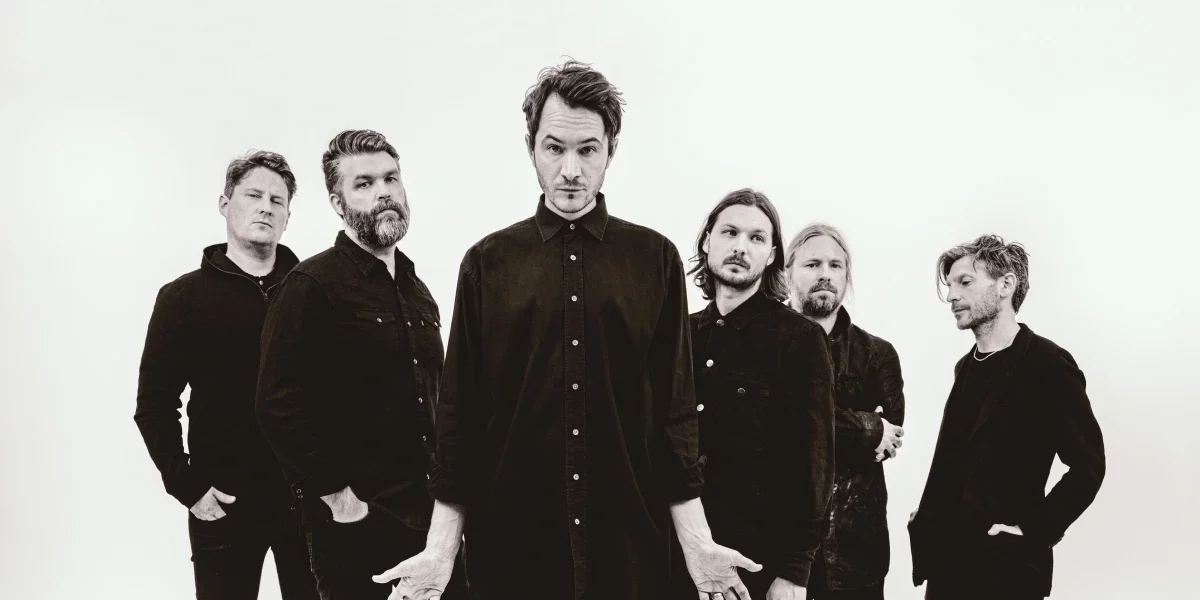Editors

Editors has never been a band to do what’s expected. When they emerged in the early 2000s, university friends from Birmingham, they were swept up in a wave of indie groups with whom they had little in common beyond playing guitars. Then, after their Mercury Prize-nominated debut in 2005, “The Back Room,” and their follow-up in 2007, “An End Has A Start,” which reached number 1, they changed their sound to include synthesizers. That was their first act of bravery, says frontman Tom Smith, and they’ve been taking risks ever since. “We’re quite used to that feeling of scaring our audience with new material,” he says with a smile.
“It seems to happen with every album,” agrees guitarist Justin Lockey. “We’ll do something that everyone really likes, and then we’ll go and do something else.”
That ‘something else’ is a heavy, breathless step, with their seventh album, EBM. It’s Editors’ most atypical material yet, an exciting, relentless push of full-bodied electro-industrial rock. Another new dawn: Benjamin John Power, also known as Blanck Mass, has co-produced the album and joined as an official member. To outside ears, it might seem like an unusual partnership: an epic rock band that has headlined Wembley Arena and an Ivor Novello-winning composer best known for his abrasive noise projects. Even Benjamin himself admits it was a “leap of faith.” But Editors’ evolution makes a lot of sense. They’ve toured with The Cure, whom they’re big fans of, and are used to playing at European festivals where they’re billed alongside harder acts. In Germany, for example, “they don’t see us as a melodic indie band,” says Justin, “they see us as super gothic.” He adds: “We talk a lot about Rammstein when we’re making this record.”
Benjamin’s path to joining Editors was surprisingly organic. He had worked on the band’s last album, 2018’s “Violence,” giving some songs a more brutal, industrial edge, whose full realizations came out as 2019’s “The Blanck Mass Sessions.” That same year, Editors were asked to headline a festival in Belgium and create a custom set for later in the evening. They approached Benjamin to see if he’d be willing to help rework their songs in a more danceable direction. But with the pandemic underway, the festival never happened, and Editors were left with a slew of new ideas during the ensuing lockdowns that were designed for, as Benjamin puts it, a “dirty rave tent.”
They continued exchanging ideas anyway, and the band began to get excited about where this music was heading: darker, sturdier, exploring their shared love for synth-pop, industrial, and alternative rock, it began to feel like a new chapter, the band’s third act. For the first time, song structures didn’t come from Tom, and he says it was a novel but exciting exercise to receive the files and work on them, with Justin, Elliott Williams (keyboards/guitars), drummer Ed Lay, and bassist Russell Leetch shaping their parts in the studio when they finally came together. “Ben has certainly been an adrenaline shot into our creative process,” says Tom. “The songs are so immediate and in your face.”
Making EBM was “a lifesaver” during the pandemic, says Elliott, “something to completely lose yourself in.” Indeed, they’ve created a world brimming with drama and intensity, which is exciting after the past few years of collective apathy. “The songs feel like an escape,” nods Tom. The album’s title is an acronym of Editors and Blanck Mass, but also a conscious reference to Electronic Body Music, the powerful sound that originated in the 1980s and has greatly influenced Editors’ new material, where synths from bands like Nitzer Ebb, Front 242, DAF, and Skinny Puppy hit darkly. Think smoke machines, strobe lights, and the smell of leather. The band has taken those influences in a distinctly Editors direction: see the soaring falsetto of ‘Kiss,’ their ‘crying-on-the-dancefloor’ hit, says Tom, which Benjamin adds “could almost be a Donna Summer song” if it weren’t so heavy. Or the catchy chorus of ‘Karma Climb,’ a marked single that combines ghostly atmospheres with a stadium-level anthem. In ‘Vibe,’ which is as close to what you might call a ‘cheerful’ Editors track, Tom wanted to put a “summery sparkle” on “a song for disconnected youths.” It’s Editors at their most super gothic, sure, but also their poppiest.
For Benjamin, it was an opportunity to flex his melodic muscles. Indeed, says Tom, it was the pioneering producer who brought the most pop ideas to the table. “I was quite impressed by how accessible they were,” he says. “It was like ABBA or something.” Benjamin, a die-hard Nine Inch Nails fan, has always been struck by the seriousness and sentimentality of Editors’ music and was also eager to ramp up the intensity after a few bleak years. “There’s a strong physicality to this record,” he says of his muscular soundscapes, which certainly echo, in places, the claustrophobia of The Downward Spiral. “I was looking forward to a kind of space where you sweat, and bodies are close.”
For the most part, EBM revels in maximalism. The rallying cry of lead single ‘Heart Attack marks its territory, a shimmering rock ballad with a twisted, noir serenade that unravels into a glorious metallic riff. From there, it’s a turbulent release of rhythms, flashes, and melancholy: all killer, no filler; full but never overstuffed. ‘Educate’ is almost symphonic in scope, as Tom intones angrily about the uncertainty of modern times. ‘Strawberry Lemonade,’ on the other hand, is a scandalous bodice-ripper full of bloopings and thumps, with drums that sound like they could punch through the speakers. The album’s closer, ‘Strange Intimacy,’ is “the most extravagant” on the album, says Tom: “it’s not a particularly happy place to end, as it’s a rather bleak vision of a relationship, but its arrangement gives it theatricality.” Certainly, it’s the most ambitious Editors have sounded, where Justin’s “ridiculous” guitar riff gives way, he says, to an “eight-minute techno odyssey” at the end.
Another change of direction is the nervy growth of ‘Silence’ – the post-rock ‘truce’ of the album, if you can call it that. Tom’s baritone has never sounded better, reminiscent of a young Johnny Cash performing Nine Inch Nails’ ‘Hurt.’ He’s never been much for direct lyrics. In EBM, there are undeniable references to the pandemic and to a divided Britain (“can you feel the nation breaking?” he intones on ‘Strawberry Lemonade’) but these are fragments of reality among the abstract, in songs that are mostly about getting lost in the unknown. “I think it’s always better when the listener can draw their own conclusions from what I write,” he says. Justin agrees. “We operate in quite an emotional space, so everyone always wants to know what the lyrics are about, but the music is half of the emotion and what sets the mood and rhythm. Sometimes it’s better to just surrender to that instead of trying to understand what something means all the time.”




